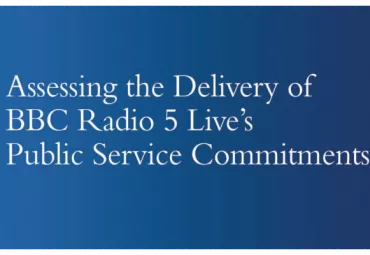About
News UK
The University of Kent Centre for Journalism (CfJ) has today unveiled findings of a research project assessing BBC Radio 5 Live’s public service commitments.
The research was produced by CfJ academics Professor Tim Luckhurst, Ben Cocking, Ian Reeves and Rob Bailey, following the award of a research grant by News UK and Ireland Ltd. It was carried out according to the University of Kent’s Standard Terms and Conditions for Research Grants, and without the involvement of News UK.
The BBC launched Radio 5 Live in 1994 as a rolling news service. Under the BBC Trust Service Licence Conditions it was required that 75% of BBC Radio 5 Live’s output would be news and current affairs programming. Since 1 January 2018, Ofcom assumed responsibility for enforcing regulatory compliance - with a specific standard that at least 75% of BBC Radio 5 Live’s output in each financial year must be news and current affairs programming.
After an extensive review of the programming on BBC Radio 5 Live - including listening to 115 hours of broadcast output between February and October 2018 - the CfJ research has found that BBC Radio 5 Live did not meet Ofcom’s requirement that 75% of its broadcast output should consist of news and current affairs during 2018. Indeed the research indicates that news and current affairs made up 44.95% of total output.
Responding to the findings, Wireless CEO Scott Taunton said: “Wireless is invested in offering additional choice in the speech radio market through our talkRADIO, talkSPORT and talkSPORT2 channels. We believe commercial radio’s sustainability is hampered by the BBC’s 80% share of speech radio listening and significant funding, spectrum and cross-promotional advantages. Distinctiveness is important in ensuring the public service delivery of BBC output and providing room for independent services to develop.”
Jimmy Buckland, Wireless Director of Strategy, adds: “There has been significant change for the BBC in recent years, with regulatory oversight moving to Ofcom following the abolition of the BBC Trust. We are concerned that BBC Radio 5 Live’s obligations to demonstrate distinctiveness and to deliver 75% news output have not been safeguarded, resulting in a reduction in public value on behalf of licence fee payers.”
For more information on the ‘Assessing the Delivery of BBC Radio 5 Live’s Public Service Commitments’ - and to read the full report - click here.

